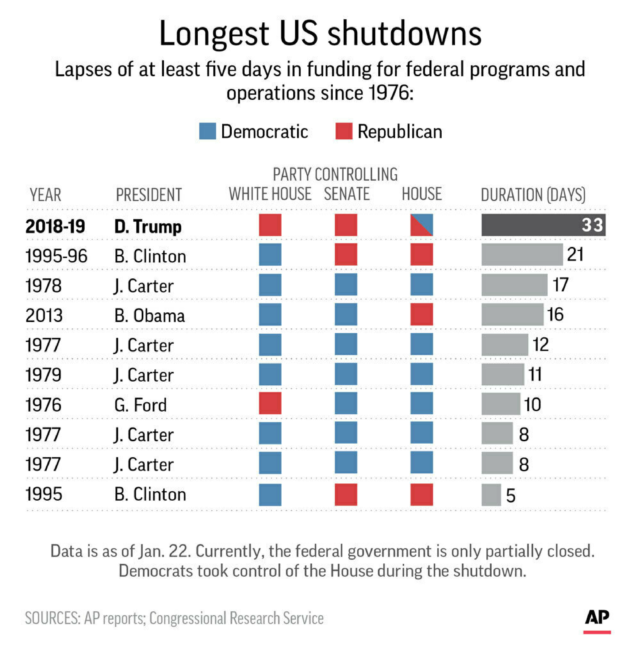As the government shutdown hits its 33rd day, government employees around the country are getting empty paychecks after weeks of work. This shutdown is the longest in U.S. history, surpassing a 21-day shutdown under President Bill Clinton from December 1995-January 1996.
The shutdown began on Dec. 22 when President Trump and the U.S. Congress could not agree on a bill to allocate funding towards the federal government in 2019. Much of the reason for the split between the two parties on the funding came from President Trump’s demand for $5.7 billion for a wall covering the U.S. and Mexico border.
Among many other governmental departments, the TSA has been hit extremely hard with employees calling in sick in protest of their unpaid labor, making for security lines with wait times measured in hours at several U.S. airports.
The Waco Regional Airport, however, has yet to really fall victim to this problem. Joel Martinez, the Director of Aviation for the City of Waco who doubles as an adjunct lecturer in the Institute for Air Science at Baylor, is wary of the impending issues if the shutdown continues.
“If and when we start to see that reduction in numbers, we will have to open our checkpoints sooner,” Martinez said. “That is kind of our contingency plan right now.”
While there have not been as many issues with TSA agents absent in Waco as opposed to some other larger airports, Martinez sympathizes with those workers who are not getting paid.
“I don’t know if I could sustain my lifestyle with zero paycheck for a month,” Martinez said. “When you get to two months you are really pushing the envelope and making people suffer.”
For one Baylor student and his family, the shutdown is not about hypotheticals and had very real effects. Wylie junior Holt Black’s older brother, Hunter Black, is an electronic technician for the U.S. Navy currently stationed in Spain whose department was one of the first to go without paychecks.
“It is definitely upsetting because he really needed those paychecks he wasn’t getting,” the younger Black said. “Without those, he wasn’t able to come home for Christmas like he had planned.”
The absence of a family member at the holiday season due to the shutdown took put things into perspective for the Black family.
“It just seems like it almost doesn’t matter the reasoning [for the shutdown],” Holt Black said. “I know my mom was really down about the whole thing.”
Hunter Black, who expects to get a full paycheck during his next pay period, shared the same sentiment as his family did.
“It was just super frustrating,” Hunter Black said. “Having to spend Christmas away from home is never ideal or anything, but under these circumstances especially.”
According to the Huffington Post, Black is one about 420,000 federal employees who have been working without pay the last month, including over 50,000 servicemen and women, a key demographic President Trump won over in his victory in the 2016 election.



